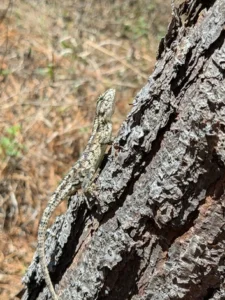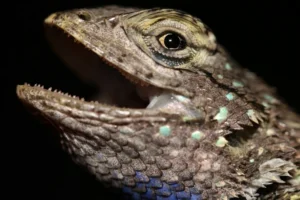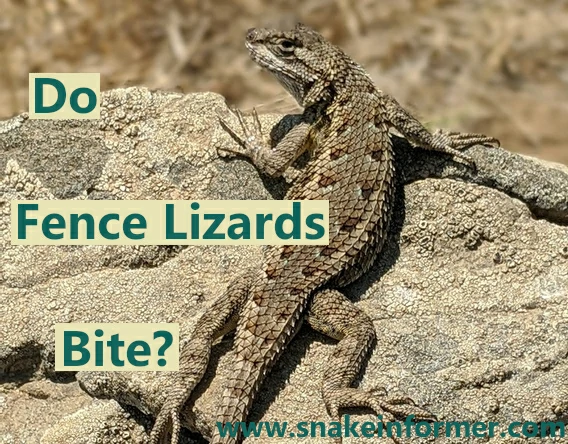Fence lizards (sometimes called blue-belly lizards) are found across much of the United States. These Lizards are commonly seen perched on fences, logs, and other elevated surfaces.
Fence lizards have small sharp teeth, and are capable of delivering a painful bite that can draw blood. That said, fence lizards are very docile and will rarely intentionally bite a human.
The most likely time a fence lizard will bite is when it is grabbed or roughly handled.
If a one of these lizards bites you, it can hurt (its teeth may puncture your skin), but likely won’t cause any real harm.
Fence lizard bites are not venomous, and are generally harmless to humans.
Why Do Fence Lizards Bite?
Fence lizards are preyed on by many small mammals, a wide variety of birds, and snakes among other predators.
For this reason, these lizards developed several ways to protect themselves.
As the first line of defense, fence lizards have a coloration that helps them camouflage or blend into tree bark, rocks, and dirt in their environments – escaping the notice of predators.

However, sometimes camouflage alone is not enough, so fence lizards also have very quick reflexes.
They are fast runners and excellent climbers, and can quickly dash up trees or under rocks to escape attackers.
When grabbed by a predator, a fence lizard can detach its tail in a process known as autotomy (meaning “self-severing” in Greek).
The detached tail whips around and wiggles on the ground, distracting the predator, while the lizard escapes.
It may also attempt to bite, to startle the attacker and have a better chance of escaping.
When you approach and grab a fence lizard, it will react in the same way it would react to a snake or any other predator in the wild.
It may attempt to bite you to defend itself.
That said, fence lizards are generally very cautious and will try to escape if they see you approach.
They only bite as a last-ditch attempt to defend themselves if they are grabbed or handled roughly.
A Bite From a Fence Lizard Is Usually Nothing to Be Worried About
Although fence lizards do bite, their bites are usually completely harmless.
These lizards have relatively small, sharp teeth, adapted for maintaining a tight grip on insects as they swallow them whole.
Their teeth are usually less than a millimeter long, so chances are, you would barely notice them if you opened a fence lizard’s mouth.

If a fence lizard bites you, its tiny teeth may scratch, or penetrate your skin (it can hurt), but the bite will most likely not cause any real harm.
Fence lizards are not venomous, so it is very unlikely that you will ever have to rush to the local emergency room.
What to Do if You Get Bitten by a Fence Lizard
If you get bitten by a fence lizard, you should take a few precautions to protect both you and the animal.
Fence lizards will typically let go shortly after biting. However, there are cases in which a lizard will bite and clamp on for an extended period. Should this happen,
- Use your other fingers to slowly push it off your finger.
Be gentle and do it close to the ground, so you don’t hurt the lizard in the process.
Once the lizard releases;
- Carefully inspect the bite area for any blood or breaks in the skin.
- Very thoroughly wash the bite area with anti-bacterial soap, under running water, to prevent any infection.
Just this will be sufficient for most fence lizard bites. However, in the rare situation that the bite causes a big break in the skin, it is advisable to seek medical attention.
Are Fence Lizards Dangerous to Humans?
Now that you know fence lizards have harmless bites, can they be dangerous to humans in other ways?
The answer is, yes.
While fence lizards are neither poisonous nor venomous, all reptiles can carry and shed salmonella bacteria.
Fence lizards can carry salmonella bacteria in their digestive tract and excrete it in their waste.
The bacteria do not cause any illness in the lizard, so a fence lizard carrying salmonella may appear clean and healthy, but can still pass the bacteria to humans.

Humans can be exposed to salmonella by direct or indirect contact with a reptile, its waste, or anything the reptiles came in contact with. (For example, you touch a fence lizard or its droppings, then stick your fingers into your mouth without first washing your hands).
Exposure to salmonella can cause an infection called Salmonellosis which is characterized by stomach cramps, diarrhea, fever, nausea, and sometimes vomiting.
Most infections only cause mild illness, but sometimes, the bacteria can spread to the bloodstream leading to serious illness.
Fortunately, merely touching a fence lizard will not cause you to contract salmonella infection. The bacteria can only cause illness when they are ingested.
To be safe, very thoroughly wash your hands with antibacterial soap, under running water – after dealing with any reptiles.
Before washing your hands, do not touch your face, rub your eyes, or put anything in your mouth.
Fence lizards Do Not Like to Be Handled by Humans.
Most lizards do not like to be handled by humans, or any other creature larger than them.
Handling a fence lizard can cause the reptile a lot of stress, especially if the lizard is restrained or being handled in a way that causes it discomfort.
Fence lizards are constantly threatened by predators, so even a human who means no harm will be perceived as a danger.
For this reason, it is a good idea to leave fence lizards alone and observe them from a distance.
Conclusion
Fence lizards are very shy creatures that are usually harmless to humans.
Understandably, they sometimes feel threatened when grabbed or roughly handled by a human, and bite to defend themselves.
A bite from a fence lizard can be painful, but usually harmless. In most cases won’t even require any sort of medical attention.
Hi, my name is Ezra Mushala, i have been interested animals all my life. I am the main author and editor here at snakeinformer.com.

